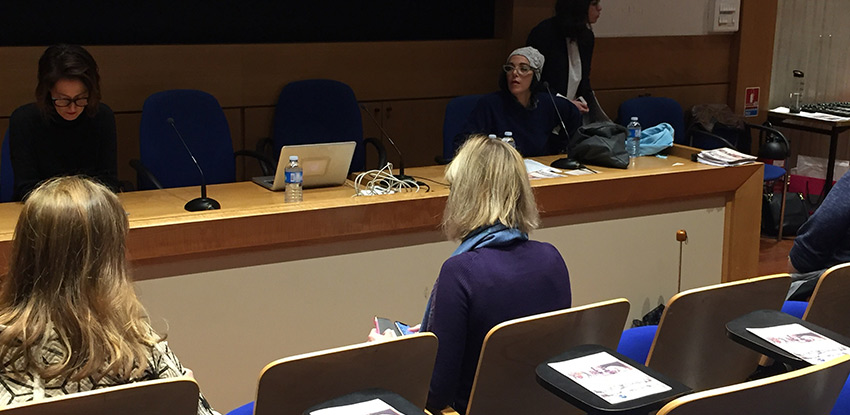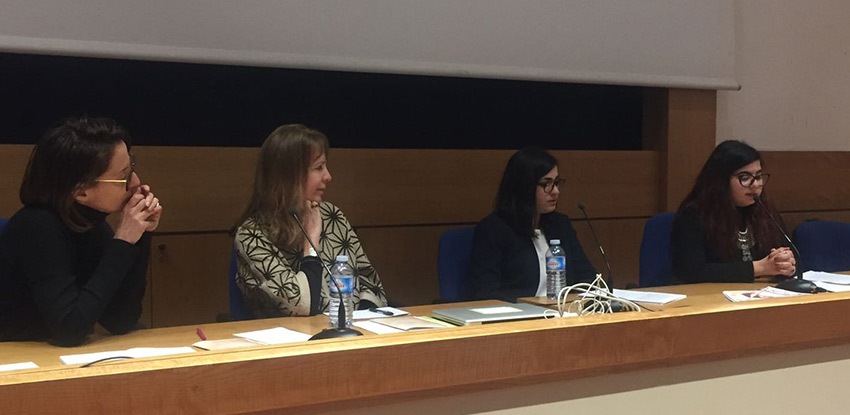- About AUP
- History of AUP
- Mission & Core Values
- Vision and Leadership
- AUP Recognition
- Alumni Success
- Campus Development
- Arts at AUP
- Policies & Guidelines
- Academics
- Undergraduate
- Graduate Programs
- MA in Diplomacy and International Law
- MA in Global Communications
- MSc in Human Rights and Data Science
- MA in International Affairs
- MA in International Affairs, Conflict Resolution, and Civil Society Development
- MSc in International Management
- MSc in Strategic Brand Management
- Find Your Thesis Advisor
- Previous Programs
- Cultural Program
- Faculty
- Summer School
- Research Centers
- The Center for Critical Democracy Studies
- Upcoming Events
- Research Projects
- Fellows’ Publications
- Publishing
- Curriculum
- Community
- Partnerships
- Visiting Scholars
- CCDS Highlights
- Atelier de Théorie Politique – Paris
- Critical Theory 101: Future Directions and New Challenges
- Martti Koskenniemi on “The Law of International Society: A Road not Taken”
- Academic Freedom Symposium
- Tocqueville Colloque 2023
- Violent Turns Conference
- Degenerations of Democracy
- DEMOS21 Inaugural Event
- What Demos for the 21st Century?
- The Paris Centennial Conference
- Justice Stephen Breyer
- Civic Jazz - The Launch of the Center
- Past Events
- FR
- The Center for Writers and Translators
- The George and Irina Schaeffer Center for the Study of Genocide, Human Rights and Conflict Prevention
- The Joy and Edward Frieman Environmental Science Center
- The Center for Media, Communication & Global Change
- The Center for Critical Democracy Studies
- Departments
- Academic Resources
- Academic Affairs
- Academic Calendar
- Academic Resource Center
- Library
- Registrar's Office
- Teaching and Learning Center
- Accessibility & Accommodation Services
- AI@AUP: A Campus-Level Initiative
- Quai D'Orsay Learning Commons
- Paris as Classroom
- ACE
- Admissions
- Student Life
- Campus
- Student Leadership & Involvement
- Paris
- Support Services
- Student Life Help Desk
- Student Accounting Services
- Student Immigration Services
- Student Grievance Procedure
- Diversity and Inclusion
- Health & Well-being
- Digital Student Handbook
- News
- Events
- AUP Giving
- Housing Offer for 2025-2026
- IT Services
- Alumni
- About AUP
- History of AUP
- Mission & Core Values
- Vision and Leadership
- AUP Recognition
- Alumni Success
- Campus Development
- Arts at AUP
- Policies & Guidelines
- Academics
- Undergraduate
- Graduate Programs
- MA in Diplomacy and International Law
- MA in Global Communications
- MSc in Human Rights and Data Science
- MA in International Affairs
- MA in International Affairs, Conflict Resolution, and Civil Society Development
- MSc in International Management
- MSc in Strategic Brand Management
- Find Your Thesis Advisor
- Previous Programs
- Cultural Program
- Faculty
- Summer School
- Research Centers
- The Center for Critical Democracy Studies
- Upcoming Events
- Research Projects
- Fellows’ Publications
- Publishing
- Curriculum
- Community
- Partnerships
- Visiting Scholars
- CCDS Highlights
- Atelier de Théorie Politique – Paris
- Critical Theory 101: Future Directions and New Challenges
- Martti Koskenniemi on “The Law of International Society: A Road not Taken”
- Academic Freedom Symposium
- Tocqueville Colloque 2023
- Violent Turns Conference
- Degenerations of Democracy
- DEMOS21 Inaugural Event
- What Demos for the 21st Century?
- The Paris Centennial Conference
- Justice Stephen Breyer
- Civic Jazz - The Launch of the Center
- Past Events
- FR
- The Center for Writers and Translators
- The George and Irina Schaeffer Center for the Study of Genocide, Human Rights and Conflict Prevention
- The Joy and Edward Frieman Environmental Science Center
- The Center for Media, Communication & Global Change
- The Center for Critical Democracy Studies
- Departments
- Academic Resources
- Academic Affairs
- Academic Calendar
- Academic Resource Center
- Library
- Registrar's Office
- Teaching and Learning Center
- Accessibility & Accommodation Services
- AI@AUP: A Campus-Level Initiative
- Quai D'Orsay Learning Commons
- Paris as Classroom
- ACE
- Admissions
- Student Life
- Campus
- Student Leadership & Involvement
- Paris
- Support Services
- Student Life Help Desk
- Student Accounting Services
- Student Immigration Services
- Student Grievance Procedure
- Diversity and Inclusion
- Health & Well-being
- Digital Student Handbook
- News
- Events
- AUP Giving
- Housing Offer for 2025-2026
- IT Services
- Alumni
The dream apartment view for any student living in Paris.
Psychology
#MeToo and #BalanceTonPorc: Translating Feminism
Home>News>
When allegations of sexual abuse and assault perpetrated by producer Harvery Weinstein emerged in October 2017, few could have predicted the social phenomenon that followed. The hashtag #MeToo, first employed by civil rights activist Tarana Burke in 2006, was used by millions of women to share stories of sexual harassment, abuse and assault. Soon it had sparked its own iterations in countries across the world; the French version is #BalanceTonPorc, widely translated as “squeal on your pig”.
On a snowy weekend in February, students, academics and interested feminists gathered at the École des hautes études en sciences sociales (EHESS) for a conference on the phenomenon of both #BalanceTonPorc and #MeToo. The event was convened by AUP’s Associate Professor and Director of AUP's Gender, Sexuality and Society program housed in the Psychology, Health and Gender Department, Lissa Lincoln, with faculty from the EHESS, the Centre national de la recherche scientifique (CNRS) and Centre de recherches historiques (CRH).
The #BalanceTonPorc movement signaled an entirely new phenomenon with regards to classic French feminism
“As the #MeToo movement and its French counterpart #BalanceTonPorc gained ever-increasing media attention on both sides of the Atlantic, we felt it would be timely to provide a platform for informed discussion and rigorous debate on these issues,” said Lincoln. “This, to us, is a role that academic institutions in general are particularly well situated to play in the larger public debate.”
The conference opened with a powerful recording of testimony upon testimony of French women recounting moments of sexual harassment and abuse, each punctuated by the phrase balance ton porc. The stories took in sexual coercion in the workplace, assault in the street and rape, creating a haunting cumulative effect.
Later, journalist at French political publication Le Point, Anna Breteau outlined the reaction of the traditional press to the social-media driven #BalanceTonPorc movement, suggesting that the traditional media failed to understand and analyze the nature of this social phenomenon, which was driven largely by a collective of individuals, rather than traditional activist groups.
“As we began to examine the questions emerging from the movement – and particularly in the media’s coverage of #BalanceTonPorc – we observed that the movement was often considered to be a continuation of traditional debates within or against French feminism, as illustrated in the now famous letter in Le Monde by Catherine Deneuve and others. Our own sense, to the contrary, was that the #BalanceTonPorc movement signaled an entirely new phenomenon with regards to classic French feminism, one that warranted our paying attention to its singularity,” said Lincoln.
Lincoln asked Sanae Alouezan, a junior at AUP studying International and Comparative Politics with a minor in Gender Studies, to share her paper, which responds to this singularity. Alouazen eruditely examined the ways in which mainstream media outlets analyzed the transgressions of high-profile men, such as Harvey Weinstein, framing them to be individual cases of dysfunction, without putting them in a systemic framework, while, she argued, the opposite phenomenon was at play for instances of perceived non-western misogyny. “When powerful institutions pay attention to women’s subordination or women’s bodies it is often to mask other injustices or to recuperate women’s rights movements in order to legitimate state violence,” she said. “Sexism is only seen as a collective issue of power relations when it is ‘othered’. Culturalization tends to construct western subjects as free of cultural influence, while it presents ‘the others’ as victims of their culture, unable to resist its claims upon them.”
Instead, she argued, the prevalence of sexual harassment and violence against women, as highlighted by the #MeToo hashtag, must be read as a systemic issue. “These are not stories about moral decadence or sexual misery, but they highlight a political problem and should be treated as such.”
“AUP is particularly well positioned to weigh in on these questions,” said Lincoln, “given the very different trajectories of French and American feminism. This was made evident in AUP undergraduate student Sanae Alouezan’s paper, which gave a rich intersectional reading of the #MeToo movement. Interestingly, Sanae remarked to me that such a paper would not have been possible in most feminist circles in France.”


